Syria: Who Is In Charge, Bashar Al-Assad or Maher Al-Assad?
By Anthony Zeitouni
Among all the information coming out of Syria, there are two pieces of news that can give us a clear idea about the political activities on both the government and opposition sides regarding the ongoing crisis in Syria. First, we have the two-day conference organized by the official commission for national dialogue. Second we have the formation of an opposition political body. The regime directing the conference failed twice. The meeting was boycotted by the opposition, and it did not issue an interesting final statement. The meeting was a gathering of a couple hundred people, most of whom are members of the Baath ruling party. In addition, some Christian and Muslim clerics and some Syrian artists, singers and actors attended. Despite the lack of attendance, the Syrian Vice President Farouq al-Shara, who lead the meeting, considered that a “success”. The final statement of this official meeting suggested forming a commission to “propose a modern constitution”. At the same time as the meeting, the Syrian authorities did not stop shooting peaceful protestors or refrain from sending their loyalists to attack both the US and French embassies in Damascus.
 Though the opposition did not attend the conference, it has organized a group of political parties and opposition figures at home and abroad. They have formed the National Coordination Committee (NCC) which is “seeking national and democratic change in Syria” as the prominent opposition leader Hassan Abdel Azim put it in an announcement. Syria’s NCC includes Arab, Kurdish and Assyrian parties, as well as nationalist and leftist parties and personalities that truly represent the opinion of the Syrian people. NCC’s formation came just days after the opposition meeting entitled “Syria for all under a democratic civil state”, which took place at Semiramis Hotel in Damascus on June 27, 2011.
Though the opposition did not attend the conference, it has organized a group of political parties and opposition figures at home and abroad. They have formed the National Coordination Committee (NCC) which is “seeking national and democratic change in Syria” as the prominent opposition leader Hassan Abdel Azim put it in an announcement. Syria’s NCC includes Arab, Kurdish and Assyrian parties, as well as nationalist and leftist parties and personalities that truly represent the opinion of the Syrian people. NCC’s formation came just days after the opposition meeting entitled “Syria for all under a democratic civil state”, which took place at Semiramis Hotel in Damascus on June 27, 2011.
This is not all. The NCC “has drafted a political document that has been sent to political parties and opposition figures for discussion and approval,” Azim told AFP in Damascus.
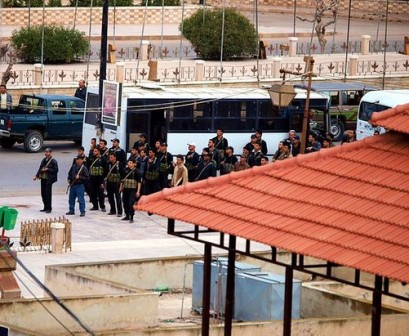 Now there is a political body for the Syrian opposition which looks for political solutions to the current crisis in Syria, instead of the military-security solutions pursued by the regime.
Now there is a political body for the Syrian opposition which looks for political solutions to the current crisis in Syria, instead of the military-security solutions pursued by the regime.
What the Syrian people expected to hear from President Bashar Al-Assad came from the opposition; a strategic exit is proposed by public figures who built their credibility as political prisoners in the Syrian jails of the Baath regime. The Syrians trust opponents such as Abdel Azim, Michel Kilo, Anwar al-Bunni, Hussein al-Awdat, Fayez Sara, etc., far more than they trust Syria’s Prime Minister, the defunct Baath party, or other officials included President Al-Assad who continued to fail to resolve the current crisis and seems to have no real approach to it.
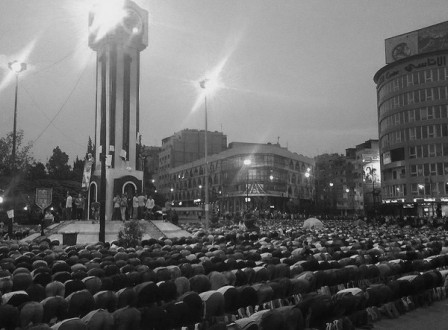 NCC announced its eights conditions to the Assad regime for the July 10th conference. NCC’s conditions include the following: a) the regime should immediately stop the “military-security option” which is reflected in the killing, arrest and humiliation of the Syrian protestors; b) stop the official “malicious media campaign against the uprising” of the Syrian people and allow international media to report from Syria; c) release all political prisoners as well as the people who were arrested during this current uprising; d) form an “independent commission of investigation” making the “security services people who shoot civilians” accountable; e) stop once and for all emergency law and other military rule; f) recognize the “right of peaceful demonstration”; g) clearly recognize “the need to repeal Article VIII of the Syrian Constitution” (stating that the ruling Baath party lead the state and the society) which represents “the title of the autocracy”; and h) an immediate announcement of “holding a national public conference in order to develop an integrated program and timetable for a comprehensive political and constitutional change” in Syria. Unfortunately the conclusions of the official conference failed to reflect any of the opposition’s points.
NCC announced its eights conditions to the Assad regime for the July 10th conference. NCC’s conditions include the following: a) the regime should immediately stop the “military-security option” which is reflected in the killing, arrest and humiliation of the Syrian protestors; b) stop the official “malicious media campaign against the uprising” of the Syrian people and allow international media to report from Syria; c) release all political prisoners as well as the people who were arrested during this current uprising; d) form an “independent commission of investigation” making the “security services people who shoot civilians” accountable; e) stop once and for all emergency law and other military rule; f) recognize the “right of peaceful demonstration”; g) clearly recognize “the need to repeal Article VIII of the Syrian Constitution” (stating that the ruling Baath party lead the state and the society) which represents “the title of the autocracy”; and h) an immediate announcement of “holding a national public conference in order to develop an integrated program and timetable for a comprehensive political and constitutional change” in Syria. Unfortunately the conclusions of the official conference failed to reflect any of the opposition’s points.
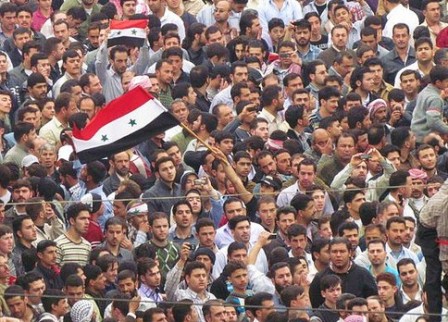 In his three speeches, Bashar Al-Assad proves that he likes the sound of his own voice and that he is still living in a state of denial. He did not propose an agenda for political reform in Syria nor did he propose an exit from the current crisis.
In his three speeches, Bashar Al-Assad proves that he likes the sound of his own voice and that he is still living in a state of denial. He did not propose an agenda for political reform in Syria nor did he propose an exit from the current crisis.
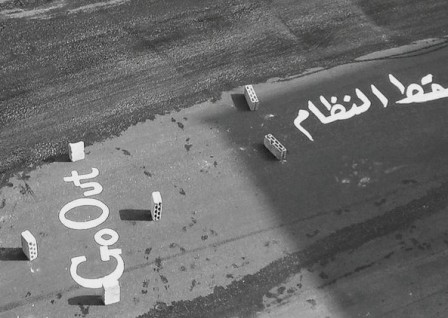 I think that the NCC offers an exit strategy to President Bashar Al-Assad. First the conference addresses him directly and does not fight against him nor overstep him. Second they offer doable and logical steps that the president can achieve immediately as a sign of responsibility and good intention toward his fellow citizens instead of aimlessly running in the vicious circle in which he finds himself.
I think that the NCC offers an exit strategy to President Bashar Al-Assad. First the conference addresses him directly and does not fight against him nor overstep him. Second they offer doable and logical steps that the president can achieve immediately as a sign of responsibility and good intention toward his fellow citizens instead of aimlessly running in the vicious circle in which he finds himself.
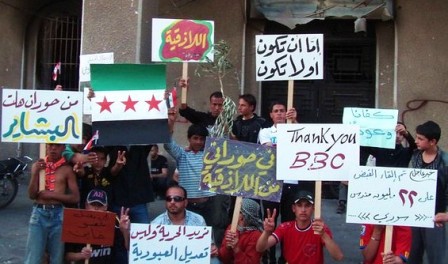 Currently, there are two trends inside the Asaad family regime: the “military-security option” lead by Maher Al-Assad and the “national dialogue option” lead by President Bashar Al-Assad. While Bashar’s option has not yet seriously started, Maher’s option has been off and running since March 2011. It has lead to the killing of 1500 Syrian citizens. As opponent Michel Kilo recently pointed out, this option “will destroy Syria”.
Currently, there are two trends inside the Asaad family regime: the “military-security option” lead by Maher Al-Assad and the “national dialogue option” lead by President Bashar Al-Assad. While Bashar’s option has not yet seriously started, Maher’s option has been off and running since March 2011. It has lead to the killing of 1500 Syrian citizens. As opponent Michel Kilo recently pointed out, this option “will destroy Syria”.
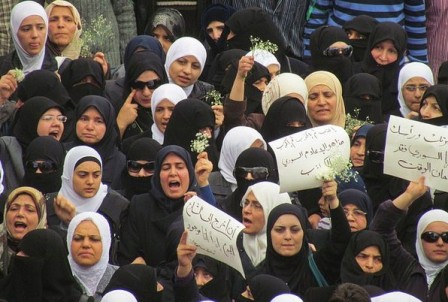 Thirty years ago, Hafez Al-Assad escaped the deadlock of his regime by exiling his brother Rifaat, who allegedly oversaw the Hama massacre of 1982. Now, Syrian history is repeating itself with Bashar and Maher. The destiny of Assad’s regime is undoubtedly linked to the question of who will have the final word: Bashar or Maher?
Thirty years ago, Hafez Al-Assad escaped the deadlock of his regime by exiling his brother Rifaat, who allegedly oversaw the Hama massacre of 1982. Now, Syrian history is repeating itself with Bashar and Maher. The destiny of Assad’s regime is undoubtedly linked to the question of who will have the final word: Bashar or Maher?
Editor’s note: All photographs by Syriana 2011. Anthony Zeitouni (anthonygaz@gmail.com ) is a Washington-based analyst who was born in Beirut, Lebanon. Follow Zeitouni on Twitter: @Anthonygaz. His web site is www.anthonyzeitouni.com
Related Articles
7 Responses to Syria: Who Is In Charge, Bashar Al-Assad or Maher Al-Assad?
You must be logged in to post a comment Login

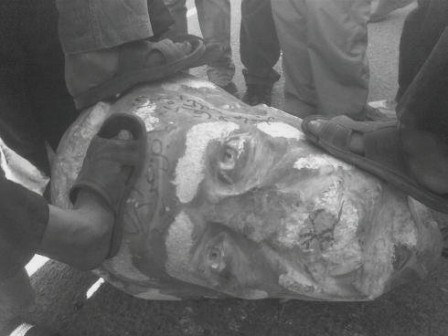











Pingback: === popurls.com === popular today
Pingback: Metodo Gabriel